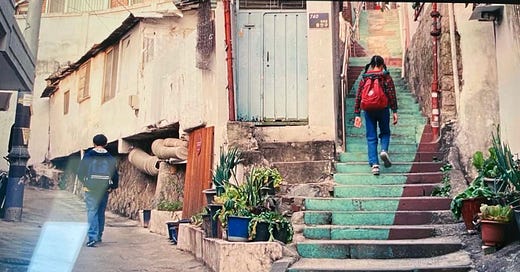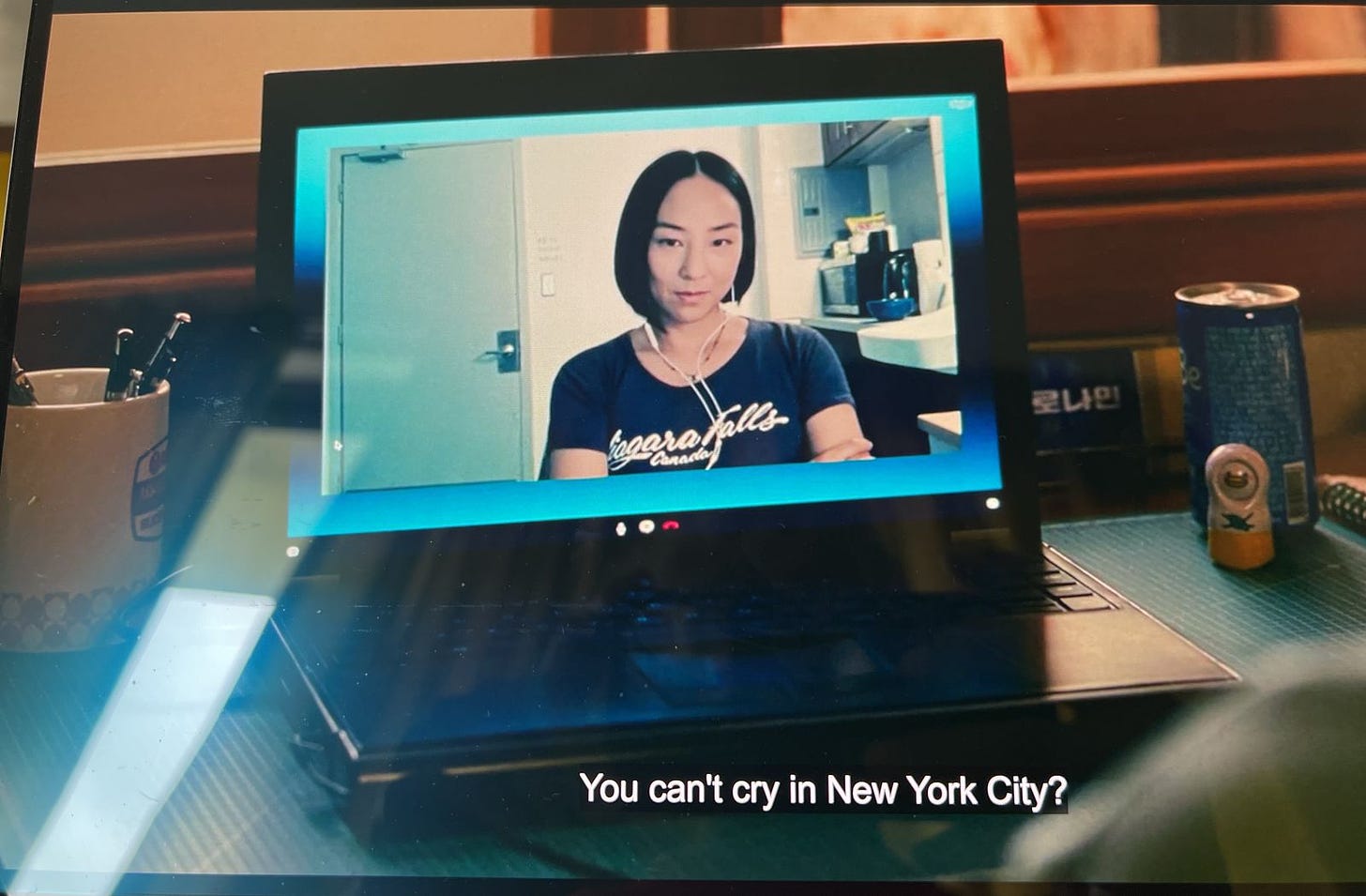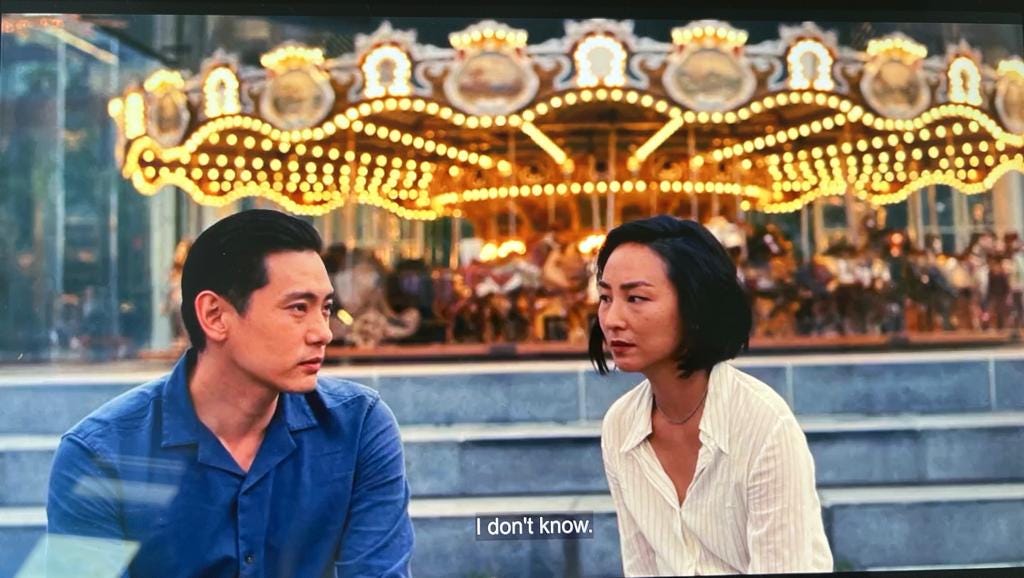Past Lives is a gorgeous movie of silences, gravity, joy - of distances which are desperate to be covered and smiles which despair to say something. It’s possibly the best film of the year.
Spoilers Alert for the film, I’m afraid!
What are our truths? What are the residencies flourishing inside us, without us knowing about them? Who are we when everything is quiet and lost and waiting - till we wake up to ourselves wondering who this person is inside our skin?
In the anarchy of a daily day, as we fight battles of livelihood, we are often at the world’s mercy and not our own person - we are what everyone expects us to be, and often we are what we have modulated ourselves to represent. Is that good or bad is moot; what is critical is that we are disconnected, oriented outwards, refusing to have a conversation with ourselves.
We are such small creatures - less than 0.075 cubic metres in volume - but our complexity is bigger than a solar system, and with more permutations of possibilities than there are stars in heaven.
We are traces of what we’ve left behind, we are the love which slipped by us when we were looking but not aware, we are the madness we deny to ourselves now but which long time back defined us, we are the sulk which held us in its throes when life started to turn on its head, we are the phrase which was our lingo when we were growing up, we are the film which made us cry through the night when we were a child, we are the truth which lay burnished in our heart because we were not ready to acknowledge it, we are the lies we told ourselves to hold ourselves up when transitions were inevitable.
We are the tragedy of leading life instead of letting it lead us.
“We are traces of what we’ve left behind, we are the love which slipped by us when we were looking but not aware, we are the madness we deny to ourselves now but which long time back defined us, we are the sulk which held us in its throes when life started to turn on its head”
In an artist’s residency, Nora explains to Arthur, a writer she meets there, the meaning of a Korean term and belief. “In Yun is a word from Buddhism which means providence or fate. It’s an In-Yun if two strangers even walk by each other in the street and their clothes accidentally brush. Because it means there must have been something between them in their past lives. If two people get married they say it’s because there have been 8000 layers of In-Yun over 8000 lifetimes.”
Nora migrated to USA from Korea when she was a child. She’d left behind a name (Na Yiung) and a twelve year old lover Hae Sung, who never forgot her. And when Hae Sung reaches out to her on Facebook, after more than a decade, she embraces the chance to revisit an old chapter of her life. And they connect the way old friends invariably do.
Until the calls, chats and the incessant sharing keeps pulling her back - and inciting thoughts of return and retraceabilities, which she resists with all the power of her ambitious being. Hae Sung asks why, and she tells him “I want to make a life here instead of looking up flights to Seoul.” And she breaks off all communication.
Till thirteen years pass and Hae Sung comes to USA to visit her. She’s now married to Arthur. And they meet, with a gentleness and a curiosity of rediscovery. Older, a little ragged, a New Yorker, she hugs him and holds on. And he is close to tears, in relief, in gratitude, and child-like asks her “What can I do? What should I say?”
There’s a casual intimacy as they walk around , but there’s also something which asks and lies unanswered.
He tells her about himself “I’m ordinary, my income is ordinary.”
Later, back at home, Arthur asks Nora about Hae Sung. She says “He’s so Korean.” And she expands on that and analyses him and talks about their differences. And he asks her “Is he attractive? “ and “Are you attracted to him?” and “Did he miss you?” And as she thinks and hesitates and answers, he sees her in person as also her image in a mirror.
What are we today? Are we the dream we dreamt of, or are we merely the progeny of time and circumstances? Arthur understands the enormity of how life is full of happenstances, and being there when things happen - and he wonders if it was mere fortune that Nora and he'd met or was it a deeper longer continuum which was always meant to be.
And then the three of them meet in a bar - and it’s obvious that the husband is the outsider - both with the language and the body language. Arthur knows this, as he sits on the side silently, letting the two connect and reminisce .
Hae Sung says “I didn’t know that liking your husband would hurt this much.”
It’s Hae Sung’s last evening in USA. And his chance to speak his heart out. He talks about what-ifs? What if he had come to USA two decades back, what if Nora had stayed back in Korea. And so on and so forth. But Hae Sung realises one simple truth of love, as he tells Nora, his voice soft, full of gentle regret “....and the reason I liked you is because you’re you. And who you are is someone who leaves.”
And she knows, and Arthur knows, that there had been a transgression, however subtle - and it was something which was beyond him, beyond her. They had both just met and said good bye to a magnificent man, full of love and grace, remembrance and beauty. They both knew Nora had again left love behind. But what was the discovered truth was how homes and countries never do depart from inside us. Memories are just a manifestation of the deeper ties which just don’t go missing because we’ve changed our name or our domicile.
“....and the reason I liked you is because you’re you. And who you are is someone who leaves.”
Past Lives is a gorgeous movie of silences, gravity, joy - of distances which are desperate to be covered and smiles which despair to say something.
Do yourself a favour - hunt this film out and see it. It’s the best film of the year.






Sometimes I feel life is no more than a tapestry of memories.
Thanks for sharing. My kind of story (traces, changes of lives, impermanence...) and the way you wrote about it, I know I will be deeply touched. Also some hope in it maybe...